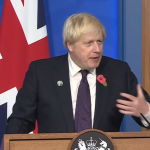At a Westminster cinema club in 2015, Sajid Javid picked a film to be shown to fellow politicos that now seems instructive to the government’s newfound approach to handling the pandemic.
The then culture secretary chose The Fountainhead; a 1949 adaptation of the novel by Ayn Rand – a doyenne of liberty-loving conservatives.
In a scene that Javid has said he reads multiple times a year, the novel’s protagonist Howard Roark proclaims to a courtroom that “the ‘common good’ of a collective – a race, a class, a state – was the claim and justification of every tyranny ever established over men”.
Please use Chrome browser for a more accessible video player
After 18 months of state-sanctioned restrictions designed to safeguard the common good, it now appears the individualistic sentiment contained in the pages of The Fountainhead is in the ascendency in government.
This week the prime minister will flesh out a broad policy shift in how the pandemic is dealt with in England.
Laws will be replaced by guidance. Telling replaced by asking. Fines replaced by an appeal to personal responsibility.
“We are going to have to learn to accept the existence of COVID and find ways to cope with it – just as we already do with flu,” writes the new health secretary.
While the approach is already winning plaudits with Conservative MPs, it has set alarm bells ringing among scientists.
Many have criticised the comparison with flu and questioned whether individual common sense is a solid enough safety belt to prevent substantial further suffering.
Follow the Daily podcast on Apple Podcasts, Google Podcasts, Spotify, Spreaker
“It’s like having a government that thinks road safety should be completely up to ‘individual responsibility’: no traffic lights, no highway code, no law about driving on the left, no crash barriers,” tweeted health psychologist Robert West.
In reality, this is not a “one or the other” choice.
The meat and drink of most policy making is deciding what level of intrusion into all our lives is acceptable because of the benefits it brings to society more widely.
Most of us accept speed limits and traffic lights because the individual impact is massively outweighed by the damage a reckless driver can do to other motorists.
But we also exercise a degree of personal responsibility.
Whilst we are generally allowed to drive at 70mph on a motorway in heavy rain, many of us would choose not to.
We decide to behave differently off our own back to protect ourselves and those around us.
Transplant this balancing act into the pandemic and the question becomes: what level of death and serious disease are we prepared to subject a minority of people to before we force the majority to start making compromises again?
On one level this is a moral question for ministers to wrestle with and – on this front – the answer may well be clear cut.
But there’s also a practical aspect to this.
The point of lockdown restrictions was primarily to safeguard the NHS. On that basis, the government should be asking itself a number of questions.
What level of COVID hospitalisations is acceptable? At what point does the damage to the NHS caused by COVID pressures- such as delayed and missed appointments and operations and staff exhaustion – begin to outweigh the damage and inconvenience of asking people and businesses to live with restrictions again?
Given the effectiveness of the vaccines, many will argue this balance should never tip in the direction of restrictions ever again.
Please use Chrome browser for a more accessible video player
After all, the severe NHS pressures caused by winter flu come and go without calls for mask wearing and social distancing.
COVID may change this equation. But as yet, we have no idea how much change it will have to usher in before ministers reach for restrictions.
In The Fountainhead, Howard Roark rails against the cause of the collective saying: “I am an architect. I know what is to come by the principle on which it is built.”
The government has sketched out the principle on which it wants to build post-pandemic England.
The coming months will tell us whether practicality will bend to the will of this principle.






















